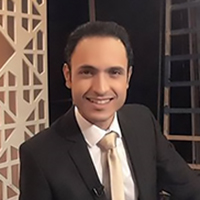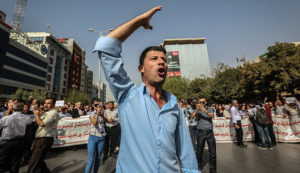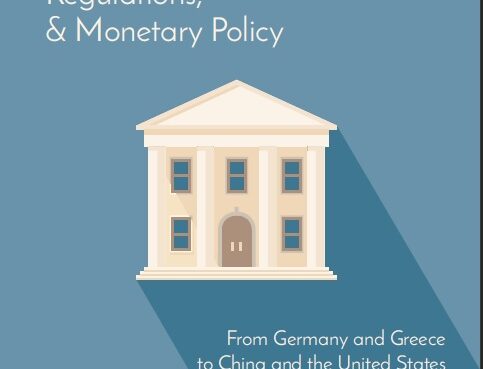
ERBIL, Iraq — The salary crisis in the Kurdistan Region of Iraq has led to further economic, political and social interdependence with Baghdad, which began to melt the Kurdish dream of independence. The economic situation has affected even the most hard-line nationalist politicians in the Kurdistan Region. Massoud Barzani, the president of Iraqi Kurdistan, visited Baghdad on Sept. 29 as the head of a major political delegation representing most of the Kurdish forces in a bid to solve outstanding economic and political issues with the Baghdad-based Iraqi government.

Teachers take part in a protest demanding delayed wages, Sulaimaniyah, Iraqi Kurdistan, Sept. 27, 2016. (photo by Twitter/@SartepOthman)
Barzani said that he demanded autonomy for the Kurdistan Region and not secession from Iraq. Similarly, Nechirvan Barzani, the prime minister of the Kurdistan Region, said June 2 that he sees Baghdad as Iraqi Kurdistan’s strategic depth.
Such statements were inconceivable before the economic crisis and the growing popular discontent in the region; the president and prime minister of the Kurdistan Region used to seize upon every opportunity to promote the declaration of the Kurdish state.
The president’s visit to Baghdad coincided with and was preceded by a series of protests in the region. Thousands of state employees — namely teachers and university professors — took to the streets Sept. 30 to protest a cut in salaries by the Kurdistan Region Government (KRG).
The KRG had decided to cut the state employees’ salaries by 50% in September 2015, and they have not been paid what was left of their salaries since July. Some employees find themselves in a dire situation.
Sarhad Kheiry, an officer in the Ministry of Municipalities and Tourism in Erbil, told Al-Monitor, “I haven’t been paid for months and I have to work as a driver to provide for my family.”
Kheiry’s story is similar to those of many other public sector employees in the Kurdistan Region. Today, citizens in Iraqi Kurdistan no longer pin the blame on the central government in Baghdad for the harsh economic situation.
Hocar Hassan, an employee in a private company in Sulaimaniyah, told Al-Monitor, “In light of the ongoing dire economic situation in Iraqi Kurdistan, people no longer blame Arab leaders in Baghdad but rather the Kurdish authorities.”
According to statements by KRG officials, the region produces 1 million barrels of oil per day, uncontrolled by Baghdad. Yet the KRG is unable to pay its employees’ salaries, while the salaries of state employees are duly paid in the rest of Iraq.
Hawnar Akrawi, a teacher in one of Erbil’s schools, told Al-Monitor, “People are now wishing to get back to Nouri al-Maliki’s time in office [as prime minister], when the salaries used to be sent to Iraqi Kurdistan and dispatched in a timely manner. The economic crisis is taking a heavy toll on many people. One of my colleagues committed suicide because of his bad living conditions. He was a father of three children.”
Al-Monitor has observed that dozens of housing projects have been put on hold and that Kurdish citizens are not frequenting shopping malls or that the malls are closed altogether.
It appears that the worsening economic situation has prompted Kurdish citizens to search for alternative economic options, most importantly relying on trade and tourism with Arabs coming from Baghdad and other provinces in the country.
Iraqi Arab tourists have jump-started cultural exchange in the Kurdistan Region. A few years back, it was rare to hear Arabic music on the streets. Today, Arab tourists feel more comfortable visiting cities in the Kurdistan Region, as, for instance, Arabic pop music is played in almost every commercial center. This could reflect the Kurdish will to challenge their leaders or be a way to approach Arab tourists.
In this context, Sarwa Abdul Wahid, a Kurdish parliamentarian for the opposition Gorran (Movement for Change), told Al-Monitor, “The Kurdish and Arab communities have nothing against each other. The existing problems are the making of politicians.”
She added, “Arab migrants coming to the Kurdistan Region are not harassed by anyone. This is further proof that the Kurdish-Arab issue is not a social problem but a political one.”
Following the Islamic State occupation of Mosul in 2014, more than 2.5 million Arab migrants arrived in the Kurdistan Region. As a result, the Kurdish community — especially young people — understands that learning Arabic is a necessary tool in order to benefit from trade and tourism with the Arab community.
Since the early 1990s, Arabic has not been taught in the region’s schools because of the semi-secession from Baghdad. As a result, Akrawi said, “The post-1990s generation has little knowledge of the history and language of Iraq.”
Use of the Arabic language has now become widespread in the Kurdistan Region, to the extent that the names of some tourist sites were changed to Arabic names, such as the popular resort town of Shaqlawa that is now called Shaqlouja because of the large number of arrivals from the city of Fallujah.
This underlines the importance of social and economic communications. Kurdish journalist Dlovan Berwari told Al-Monitor, “What matters most for the Kurds is to be able to make a living. The economic crisis has revealed that sticking with the Baghdad-based government is better than the inexperienced politicians in the KRG.”
Kheiry said in this regard, “We feel ashamed of the actions of our politicians.”
Hassan added, “If the dream of a Kurdish state causes the economy to collapse, the Kurdish people will not support it.”
Abdul Wahid said, “Most of the Kurdish people believe that rapprochement with Baghdad will be a breakthrough in the ongoing crisis.”
Berwari spoke along the same lines, saying, “Every Kurdish person calling for unity with Baghdad is eagerly waiting for the federal government to care for their citizens in the Kurdistan Region.”
Thus, the sharp nationalist slogans calling for secession from Baghdad will hit two walls: the dire economic situation and the social and cultural communication between Arabs and Kurds, as this has been the status quo in the country since 2003.
(*)Ali Taher is a professor of political sociology at Baghdad University, researching ٍShiite political Islam, ethnicities and minorities.
TranslatorSahar Ghoussoub
Source: El Monitor, October 5, 2016







Comment here